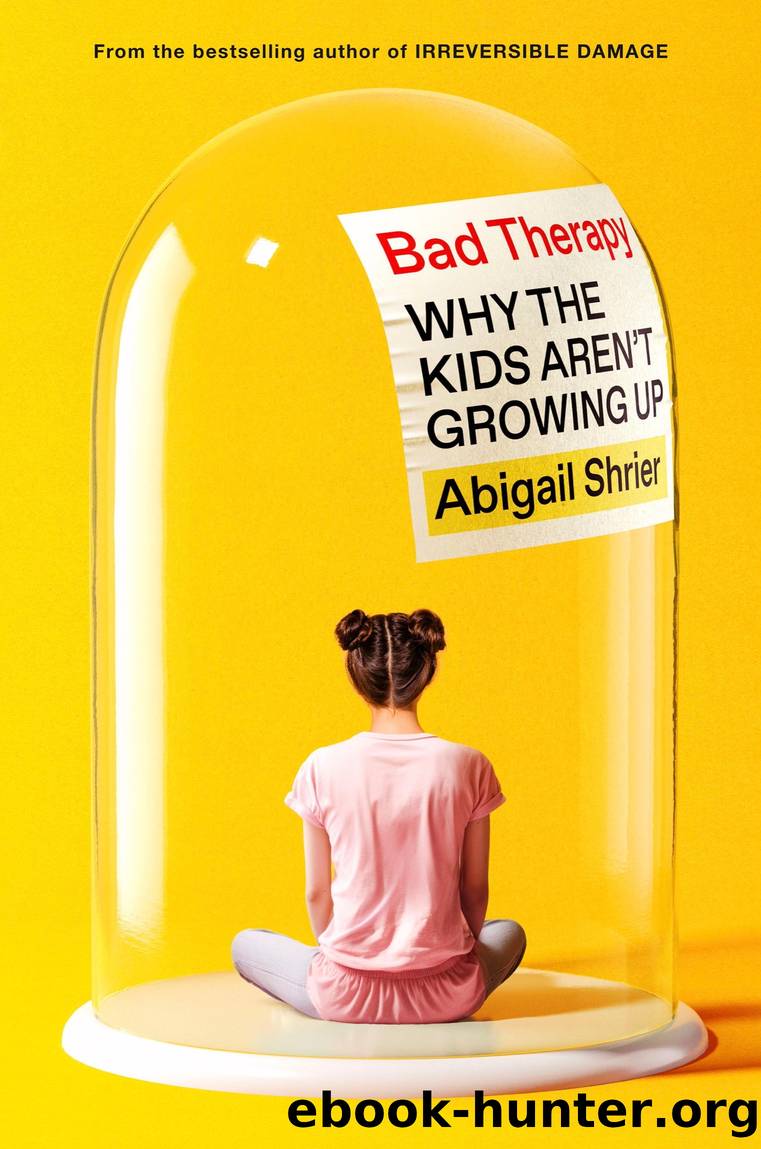Bad Therapy by Abigail Shrier

Author:Abigail Shrier [Shrier, Abigail]
Language: eng
Format: epub
Publisher: Penguin Publishing Group
Published: 2024-02-27T00:00:00+00:00
The Tattletale Generation
Consider the messages therapeutic education broadcasts to students: You canât manage your own conflicts. You are filled with trauma and need our âtrauma-informed care.â You are constantly contemplating suicide or engaging in self-harm. You are breaking or broken. You cannot possibly survive a bad grade or a firm deadlineâchallenges kids have met since the invention of school.
Like the disempowered masses of a totalitarian regime, kids reach for the remaining implement in an otherwise empty toolbox: tattling. Virtually every parent I talked to mentioned with alarm the profusion of tattling at their kidsâ schoolsâeven at the high school level.
One mom, Ellen, who consults to private school parents, apprised me of a bizarre and chilling trend among the rising generation. Many teens maintain a cache of screenshots to incriminate their friends just in case they should need to retaliate against an accuser.
A major part of Ellenâs national consulting business involves advising families whose kids have been accused by another student. And the moment a parent contacts her for help in such a crisis, that parent also typically sends along an incriminating cache on the student accuser. At first, Ellen was stunned. How did you come across these old pictures? she would ask. The answer was always the same: Oh, my kid saved these screenshots of her friends saying something racist or doing something stupidâjust in case.
Call it insurance. Call it blackmail. Call it what it is: utterly bananas.
âThe whole reason why we have juvenile laws that allow for sealing of records before the age of eighteen is because society recognizes the importance of these young kids who have made mistakes getting a fresh start with a clean record,â Ellen said. But racism or the endless fill-in-the-phobia allegations made by young people rarely require substantiation to inflict real damage. Nor do they ever occur in the court of law, where they would be sealed. They exist on kidsâ phones. In the worst instances, they threaten to trail a child for decadesâmaybe for the rest of her life.
As I listened to Ellen, I wondered if this was a local phenomenon. But in July of 2020, the New York Times reported on dozens of instances in which universities had rescinded admissions of students after having received screenshots of racist or inappropriate Snapchat communications, Instagram posts, or textsâall of it sent to the universities by other students.[13] Some of the videos and screenshots were of incidents that had occurred years earlierâmeaning, students had been maintaining the caches for years, just as Ellen had told me.
This is a consequence of the life we have made for the rising generation. Monitored like babies in cribs, treated like patients in a psychiatric ward, they disbelieve they can trust each other or handle conflicts themselves. They slide into the habits of âgrudge informants,â pitiable citizens of Stalinâs Russia, Maoâs China, and todayâs high school. Resolving mundane conflicts with peers seems above their paygrade. Better to inform their superiors. They do not behave like teammates in a great society. They behave like the survivors of the remnants of one, after all order has broken down.
Download
This site does not store any files on its server. We only index and link to content provided by other sites. Please contact the content providers to delete copyright contents if any and email us, we'll remove relevant links or contents immediately.
Nudge - Improving Decisions about Health, Wealth, and Happiness by Thaler Sunstein(6643)
iGen by Jean M. Twenge(4705)
The Fire Next Time by James Baldwin(4350)
Adulting by Kelly Williams Brown(3681)
The Sports Rules Book by Human Kinetics(3597)
The Hacking of the American Mind by Robert H. Lustig(3588)
The Ethical Slut by Janet W. Hardy(3511)
Captivate by Vanessa Van Edwards(3306)
Mummy Knew by Lisa James(3174)
In a Sunburned Country by Bill Bryson(2953)
The Worm at the Core by Sheldon Solomon(2928)
Ants Among Elephants by Sujatha Gidla(2928)
Suicide: A Study in Sociology by Emile Durkheim(2614)
The Slow Fix: Solve Problems, Work Smarter, and Live Better In a World Addicted to Speed by Carl Honore(2578)
Humans of New York by Brandon Stanton(2382)
Handbook of Forensic Sociology and Psychology by Stephen J. Morewitz & Mark L. Goldstein(2380)
Blackwell Companion to Sociology, The by Judith R. Blau(2320)
The Happy Hooker by Xaviera Hollander(2276)
Outliers by Malcolm Gladwell(2263)
